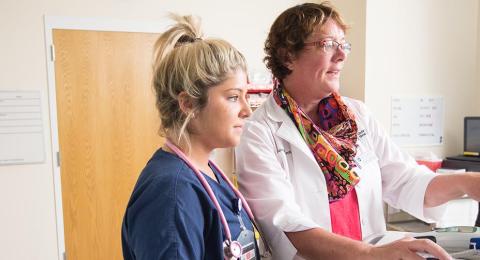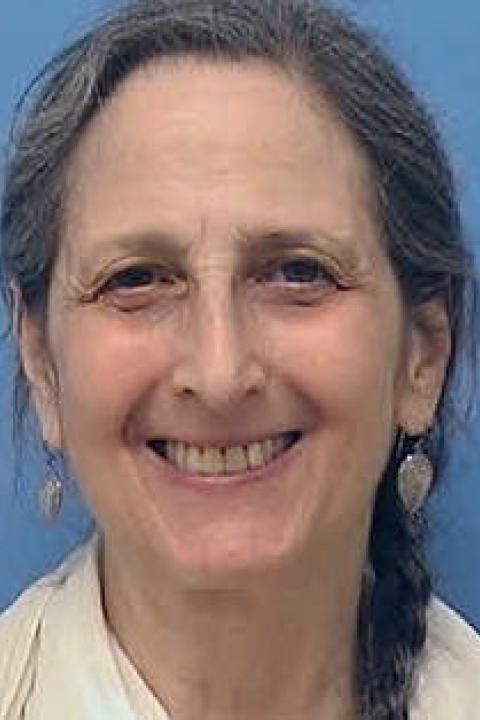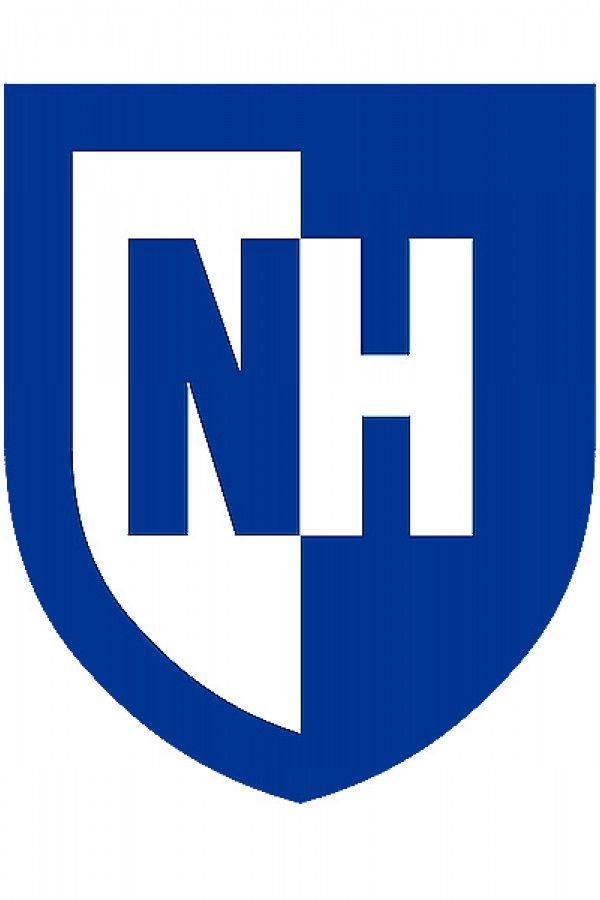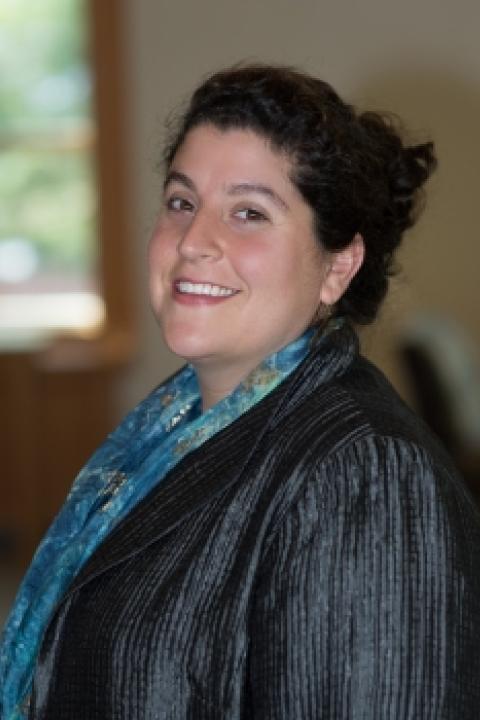Why get a Master's degree in Nursing: Evidence-Based Nursing?
The Evidence-Based Nursing (EBN) program focuses on developing advanced generalist nursing practice in a focused area of study, promoting interdisciplinary collaboration, fostering life-long learning and preparing students for the leading edge of healthcare knowledge and delivery. Students strengthen their knowledge and skills in clinical decision-making, application of nursing interventions and ability to critique and appropriately use evidence as a foundation for practice.In this program, students study nursing as an applied discipline advancing their knowledge of theoretical perspectives for clinical practice, with an emphasis on leadership, quality improvement methodologies, and the cultural, social and political context of health and illness. Students gain valuable experience in leadership strategies to improve quality care in nursing practice through a minimum 112-hour clinical practicum.
Why choose UNH's M.S. in Evidence-Based Nursing program?
At UNH you’ll be supported by a productive faculty and outstanding facilities as you advance your nursing career. Faculty members conduct research in family-based health issues such as women’s health, health promotion for children and adolescents, and nursing care for the elderly. Clinical practicum sites are by arrangement in local, regional and teaching hospitals, clinics, community health agencies, primary care and other urban and rural healthcare settings in New Hampshire, Massachusetts, Vermont, Maine and other sites by permission.
Potential Career Areas
- Hospitals
- Long-term care facilities
- Correctional facilities
- Home health agencies
- Military
- Physicians’ offices
- Primary care clinics
- Schools
- Social service agencies
- Workplace clinics
Curriculum & Requirements
Evidence-Based Practice
The Evidence-Based Practice track focuses on developing advanced generalist nursing practice in a focused area of study, promoting interdisciplinary collaboration, fostering life-long learning, and preparing students for the leading edge of health care knowledge and delivery. Students strengthen knowledge and skills in clinical decision making, the application of nursing interventions, and their ability to critique and appropriately use evidence as a foundation for practice. In this graduate track, students study nursing as an applied discipline, advancing their knowledge of theoretical perspectives for clinical practice, with an emphasis on leadership; the cultural, social, and political context of health and illness; and quality improvement methodologies. Students are mentored in the enactment of leadership strategies to improve quality care in nursing practice through an intensive clinical practicum.
Admission Requirements
Registered nurses (RNs) who have successfully passed the NCLEX-RN, currently hold an unencumbered, active RN license in the United States, and who hold a baccalaureate degree in either nursing or another field can be considered for admission. Applicants are required to have a good academic record and completion of coursework in statistics and research. The following is required:
- Unencumbered, active RN license in the United States
- Baccalaureate degree in nursing or another field
- Cumulative GPA of 3.0 or higher in associate and baccalaureate programs
- Nursing experience is preferred but not required for Clinical Nurse Leader and Evidence-Based Practice tracks
- Successful completion of undergraduate statistics course and undergraduate research course
- 3 letters of recommendation Professional references should be substantial, and an academic reference is recommended. Letters of recommendation from family or friends are not acceptable.
- Admission committee may request an interview
RNs whose baccalaureate degree is in a field other than nursing may apply to the master of science degree in nursing (MS) program and will be considered for the track that is commensurate with their clinical experience based on faculty discretion.
Degree Requirements
Clinical Hours: 112*
| Code | Title | Credits |
|---|---|---|
| Required Courses | ||
| NURS 812 | Advanced Pharmacology and Therapeutics | 3 |
| NURS 814 | Advanced Health Assessment Across the Lifespan | 3 |
| NURS 816 | Health Promotion Theory and Population Health | 3 |
| NURS 818 | Foundations of Evidence Based Practice | 3 |
| NURS 820 | Advanced Physiology and Pathophysiology Across the Lifespan | 3 |
| NURS 917 | Biostats and Epidemiology | 3 |
| NURS 943 | Fundamentals of Quality Improvement & Safety in Healthcare | 3 |
| NURS 955 | Evidence Based Nursing Scholarly Project I | 3-12 |
| NURS 956 | Evidence Based Nursing Scholarly Project II | 3 |
| NURS 969 | Health Systems Policy, Economics & Financial Planning | 3 |
| NURS 910 | Genomics & Ethics | 3 |
| NURS 815 | Leadership, Role, and Collaboration | 3 |
| Total Credits | 36-45 | |
- *
Clinical hours are completed through the following required course: NURS 955.
Accelerated Master's Overview
Accelerated Master’s programs offer qualified University of New Hampshire undergraduate students the opportunity to begin graduate coursework in select graduate programs while completing a bachelor’s degree. Accelerated master's programs are designed to provide students with an efficient and cost-effective pathway to earn both a bachelor's and master's degree or graduate certificate, enhancing career opportunities and long-term earning potential.
Accelerated Master's Highlights
- Begin studying advanced topics while an undergraduate student with the opportunity to complete a master’s degree or graduate certificate early.
- Master’s degree program students: Earn up to 12* graduate (800-level) course credits while completing a bachelor’s degree. This coursework will count as dual-credit toward both the bachelor’s and master’s degrees.
- Graduate certificate program students: Earn up to 8* graduate (800-level) course credits while completing a bachelor’s degree. This coursework will count as dual-credit toward both the bachelor’s degree and the graduate certificate.
- Students complete the bachelor’s degree, and then officially matriculate into the master’s or graduate certificate program to complete the remaining required graduate-level coursework.
*Some exceptions apply.
Accelerated Master's Admission Requirements
- A minimum 3.2 cumulative GPA is required.*
- A minimum of 90 undergraduate credits must be completed prior to enrolling in graduate (800-level) courses.
- Streamlined Graduate School Application (two letters of recommendation; most standardized tests and application fee are waived).*
*Some exceptions apply.
Accelerated Master's Requirements
- Students must attend a mandatory orientation session.
- Students must submit a special registration form each semester for dual-credit courses and note any DegreeWorks exceptions.
- Students may defer graduate matriculation for up to one year after earning their bachelor’s degree in most programs.
- See the Accelerated Master’s Catalog Policy and Accelerated Master’s Website for additional information and a list of programs. Note that some programs have additional requirements (e.g. higher-grade expectations) compared to the general policy.
Nursing: Evidence-Based Practice (MS) Accelerated Option
This graduate degree program is approved to be taken on an accelerated basis in articulation with the following undergraduate program(s):
| Code | Title | Credits |
|---|---|---|
| Nursing (B.S.) | ||
| Students select from the following approved 800-level courses that can be completed in the undergraduate senior year for dual credit: | ||
| NURS 812 | Advanced Pharmacology and Therapeutics | 3 |
| NURS 814 | Advanced Health Assessment Across the Lifespan | 3 |
| NURS 816 | Health Promotion Theory and Population Health | 3 |
| NURS 818 | Foundations of Evidence Based Practice | 3 |
| NURS 820 | Advanced Physiology and Pathophysiology Across the Lifespan | 3 |
| NURS 815 | Leadership, Role, and Collaboration | 3 |
Program Learning Outcomes
The Masters of Science Evidence Based Practice program builds upon the skills of the baccalaureate prepared nurse.
At the completion of the Master's nursing program, the graduate student is prepared to:
- Integrate, translate, and apply knowledge from nursing and other disciplines, to formulate clinical judgment and innovation in nursing practice.
- Design person-centered care that builds on a scientific body of knowledge focusing on individuals with multiple complicated circumstances, including family and/or important others.
- Advocate for healthcare delivery from public health prevention to disease management through collaborative activities for equitable population health outcomes.
- Disseminate nursing knowledge to improve health care.
- Integrate established and emerging principles of safety as core nursing values to enhance quality and minimize harm to patients and providers.
- Lead collaborative care teams to optimize patient outcomes and improve health care experiences.
- Coordinate resources for diverse populations to provide safe, quality, and equitable care.
- Utilize informatics and communication technologies in developing and delivering optimal healthcare services according to best practice and professional and regulatory standards.
- Cultivate a sustainable professional nursing identity that reflects nursing’s characteristics and values.
- Utilize leadership skills, change theories, and effective decision making in advanced nursing roles in the provision of care.
Professional Licensure/Certification Disclosures
This is a non-licensure degree program. No additional license is required to practice in this field.
Visit the Office of the Registrar's website for more information about university programs that lead to professional licensure or certification eligibility.
Deadlines
Applications must be completed by the following deadlines in order to be reviewed for admission:
- Fall: Recommended April 1, Final Deadline if space available August 1
- Spring: N/A
- Summer: N/A
- Special: N/A
Application fee: $65
Campus: Online
New England Regional: No
Accelerated Masters: Yes (for more details see the accelerated masters information page)
New Hampshire Residents
Students claiming in-state residency must also submit a Proof of Residence Form. This form is not required to complete your application, but you will need to submit it after you are offered admission, or you will not be able to register for classes.
Transcripts
If you attended UNH or Granite State College (GSC) after September 1, 1991, and have indicated so on your online application, we will retrieve your transcript internally; this includes UNH-Durham, UNH-Manchester, UNH Non-Degree work and GSC.
If you did not attend UNH, or attended prior to September 1, 1991, then you must upload a copy (PDF) of your transcript in the application form. International transcripts must be translated into English.
If admitted, you must then request an official transcript be sent directly to our office from the Registrar's Office of each college/university attended. We accept transcripts both electronically and in hard copy:
- Electronic Transcripts: Please have your institution send the transcript directly to grad.school@unh.edu. Please note that we can only accept copies sent directly from the institution.
- Paper Transcripts: Please send hard copies of transcripts to: UNH Graduate School, Thompson Hall- 105 Main Street, Durham, NH 03824. You may request transcripts be sent to us directly from the institution or you may send them yourself as long as they remain sealed in the original university envelope.
Transcripts from all previous post-secondary institutions must be submitted and applicants must disclose any previous academic or disciplinary sanctions that resulted in their temporary or permanent separation from a previous post-secondary institution. If it is found that previous academic or disciplinary separations were not disclosed, applicants may face denial and admitted students may face dismissal from their academic program.
Letters of recommendation: 3 required
Recommendation letters submitted by relatives or friends, as well as letters older than one year, will not be accepted.
References should be substantial with one academic, if available, and two current nursing professionals with graduate education background.
Personal Statement/Essay Questions
Prepare a brief but careful statement regarding:
- Reasons you wish to do graduate work in this field, including your immediate and long-range objectives.
- Your specific research or professional interest and experiences in this field.
Additional Department Requirements
Applicants are required to have an unencumbered RN license in the United States, degree in nursing or outside nursing, and successful completion of undergraduate statistics and research to be eligible to apply to this program.
Non-BSN Admission Requirements:
RNs whose baccalaureate degree is in a discipline other than nursing may apply to the master of science degree in nursing (M.S.) program and will be considered for the track that is commensurate with their clinical experience based on faculty discretion.
- Unencumbered, active RN license in the United States
- Baccalaureate degree in another field
- Cumulative GPA of 3.2 or higher in associate and baccalaureate programs
- Nursing experience preferred but not required
- Successful completion of undergraduate statistics course and undergraduate research course
- Interview may be requested
Important Notes
All applicants are encouraged to contact programs directly to discuss program-specific application questions.
International Applicants
Prospective international students are required to submit TOEFL, IELTS, or equivalent examination scores. English Language Exams may be waived if English is your first language. If you wish to request a waiver, then please visit our Test Scores webpage for more information.
























